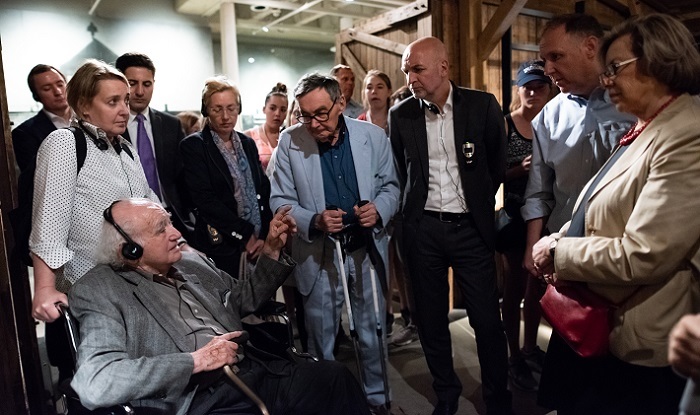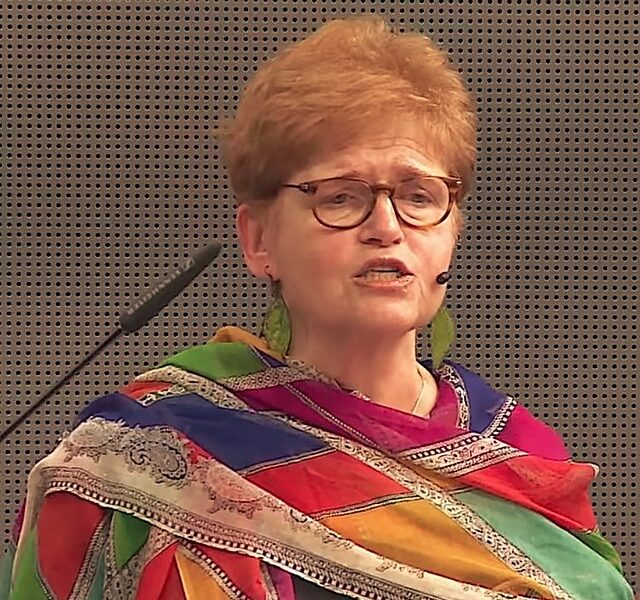
PHOTO: Holocaust survivor Roman Kent shared with the German representatives (including with German State Secretary Dr. Rolf Bösinger) and museum goers his personal experience of being deported to Auschwitz and the horrific conditions he endured.
A significant increase in funding for social welfare services for Holocaust survivors was announced on July 10 in a ceremony at the U.S. Holocaust Memorial Museum in Washington, D.C.
Julius Berman, president of the Conference on Jewish Material Claims Against Germany (Claims Conference), announced the outcomes from the organization’s negotiations on behalf of Jewish Holocaust survivors with the German government. “The significant increase for social welfare services secured by our negotiating team will lead to more home care, food support, medicine and transportation services for Jewish Holocaust survivors around the world,” said Claims Conference President Berman.
The negotiations resulted in a €75 million ($87.75 million) increase in funding for social welfare services for Holocaust survivors, bringing total global allocations for 2019 to €480 ($564 million).
With the U.S. Holocaust Memorial Museum in Washington, D.C., as a backdrop, the German delegation met with the Claims Conference negotiating delegation and heard first-hand testimony from survivors about the critical need for funding increases.
Claims Conference Special Negotiator Ambassador Stuart Eizenstat stated, “I am particularly pleased as we enter the last stage of a more than 70 year effort by the Jewish Claims Conference to work with the German government to provide a measure of justice for Holocaust survivors, that the recently formed new German government has shown that they share our sense of urgency to insure that in their declining years Holocaust survivors, who suffered so greatly in their youth, live their remaining years in dignity. We have been able to get a major increase of some $200 million in additional funding for critically important home care and in monthly pensions for survivors. Over the last decade, we increased funding for home care from €30 million to €405 million in 2018, and, now, to €480 million in 2019.”
Of the negotiations, Claims Conference Executive Vice President Greg Schneider said, “Although no amount of money can ever compensate for the indescribable suffering and losses of Holocaust survivors, these elderly heroes deserve the recognition that increased payments and much-needed services will provide. It’s been over 70 years since the war ended and time is running out for survivors. We need to ask ourselves: if not now, when?”
Survivor representatives of the Claims Conference delegation, Roman Kent and Marian Turski, both survivors of the Lodz Ghetto and Auschwitz, accompanied German officials on a tour through the museum. A cattle car in the museum’s permanent exhibition served as an impromptu setting where Roman Kent shared with the German representatives and museum goers alike, his personal experience of being deported to Auschwitz and the horrific conditions he endured.
Kent said, “When I am asked how long I was in Auschwitz, my answer is … I don’t know. What I do know is that one minute in Auschwitz was like a day, a day was a year, and a week an eternity. How many eternities can one have in a single lifetime? I don’t know the answer to that either.”
The Claims Conference negotiating delegation is continuously advocating for Jewish Holocaust survivors with the German government throughout the year to address unmet needs and expand criteria for compensation. In addition to the funding increase for social welfare services, negotiations this year achieved the following:
- Article 2 and Central and Eastern European Fund (CEEF) pensions, which the Claims Conference pays to 55,000 Holocaust survivors will increase by 53.6% over the next three years from €352 ($411) to €541 ($633). The first increase to €415 ($485) will commence on January 1, 2019.
- The criteria for the Child Survivor Fund payments has been liberalized. The length of time child survivors need to have been in hiding or living under false identity was reduced from six months to four months.
The Claims Conference currently funds in-home care for approximately 76,200 needy and frail survivors around the world, so they are able to remain in their own homes. Additionally, the organization assists over 62,000 survivors with other vital services including food, medicine, transportation to doctors and programs to alleviate social isolation.
The Claims Conference negotiations delegation is comprised of Special Negotiator, Ambassador Stuart Eizenstat; Co-Chair, Roman Kent; Holocaust survivor leaders, Ambassador Colette Avital, Ambassador Reuven Merhav, Ben Helfgott and Marian Turski; Rabbi Andrew Baker; and Claims Conference Executive Vice President Greg Schneider.
About the Claims Conference: The Conference on Jewish Material Claims Against Germany (Claims Conference) a nonprofit organization with offices in New York, Tel Aviv and Frankfurt, secures material compensation for Holocaust survivors around the world. Founded in 1951 by representatives of 23 major international Jewish organizations, the Claims Conference negotiates for and disburses funds to individuals and organizations, and seeks the return of Jewish property stolen during the Holocaust. As a result of negotiations with the Claims Conference since 1952, the German government has paid more than $70 billion in indemnification to individuals for suffering and losses resulting from persecution by the Nazis. In 2018, the Claims Conference will distribute approximately $400 million in direct compensation to over 80,000 survivors in 83 countries and will allocate approximately $500 million in grants to over 200 social service agencies worldwide that provide vital services for Holocaust survivors such as homecare, food and medicine.
For more information, please visit: www.claimscon.org





